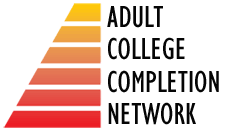More than One Path to Meeting the Adult Degree Completion BIG GOAL
Published by: WCET | 10/20/2011
Tags: Assessment, Completion, Faculty, Military And Veterans, Prior Learning Assessment, Student Success, Workforce/Employment
Published by: WCET | 10/20/2011
Tags: Assessment, Completion, Faculty, Military And Veterans, Prior Learning Assessment, Student Success, Workforce/Employment
Lumina Foundation has a BIG GOAL: To increase the proportion of Americans with high-quality degrees and credentials to 60 percent by the year 2025. Over the past several years, they have supported many projects that are of sufficient scale to reach this goal.
This week I have been attending a meeting of WICHE’s Adult College Completion Network. Funded by Lumina Foundation, the Network unites organizations and agencies working to increase college completion by adults. Included in the meetings are both Lumina-funded projects and other promising efforts that are re-engaging adults in completing their degrees.
You can find information about many such projects on the Network website. During the meeting we had “speed dating” sessions where participants could share information about the efforts to increase college completion for adults. Here are highlights of some of my “dates:” 
West Virginia Higher Education Policy Commission – Student Affairs Training
The universities, community, and technical colleges are partnering with NASPA – the national student affairs organization. They have created a multi-tier “train-the-trainers” initiative with the ultimate aim of enhancing adult-focused student services at the state’s institutions. So far they held a 3-day workshop with 38 student and academic affairs staff from the state. This fall those participants will become trainers in eight regional workshops held throughout the state. It will be interesting to watch this project develop, as it could become a model for how rolling out adult-friendly student and academic services throughout a state.
Goodwill Industries – Community College/Career Collaboration (C4)
I have long heard of Goodwill, but was blown away by their commitment to finding jobs for people and getting people the education needed to fill those jobs. They noticed that three local Goodwill communities had done an exceptional job of creating collaborations with community colleges. Through these C4 partnerships they had increased college and career success for low-income adults. In the short term they are expanding out to twenty more communities with the goal of reaching a total of 60 within three years.
Council for Adult and Experiential Learning – Learning Counts
Rather than each institution running its own prior learning assessment, CAEL is creating a service (Learning Counts) to help students navigate this confusing process. Students are paired with counselors who help the students determine what is best for them. Some are counseled that an assessment is not for them, while others are steered to take exams, such as ACE or CLEP. If a student should pursue a prior learning assessment, they are counseled to take a course that teaches them how to create a portfolio of their past experiences. The portfolio is examined to determine the number of ACE-transcripted credits that should be awarded.
Minnesota State Colleges and Universities – Veterans Programs and Services
The Minnesota National Guard has partnered with the state’s colleges and universities to better serve current Guard members and veterans after they return. Services include granting academic credit for military training, concurrent enrollment for courses that will count both for military purposes and academic credit, and assisting veterans in career and education planning upon their return.
I hope this gives you a flavor of the great diversity of adult-centered projects that are out there. To learn about other projects, go to the Adult College Completion Network’s website. See Lumina Foundation’s website to see other ways that they plan to meet their BIG GOAL.
Russ
Russell Poulin
Deputy Director, Research and Analysis
WCET – WICHE Cooperative for Educational Technologies
rpoulin@wiche.edu
wcet.wiche.testing.brossgroup.com